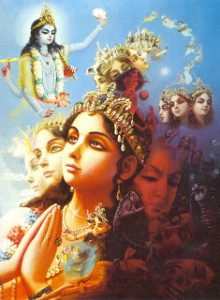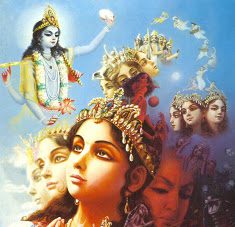Avinoda-vāda
July 18, 2013 (VNN) by Advaita Das
 Pandora’s box produces ever-new jīva-tattva speculations – we had fall-vāda, envy-vāda, dream-vāda, fall from taṭastha-vāda (will be discussed later) and first-become-lord-Brahmā-vāda. Now there is a new siddhānta – boredom-vāda.
Pandora’s box produces ever-new jīva-tattva speculations – we had fall-vāda, envy-vāda, dream-vāda, fall from taṭastha-vāda (will be discussed later) and first-become-lord-Brahmā-vāda. Now there is a new siddhānta – boredom-vāda.
Dāmodar Das
One devotee writes: By the way, Kṛṣṇa creates and oversees physical worlds as He has nothing to do, so says the famous commentary on verse 2.1.33 of “Srī Vedanta-sutra.” This commentary states that Śrī Kṛṣṇa is like bored, very rich Prince, who plays a variety of games simply because of boredom, nothing to do and just to have fun. This commentary was written for the first time by Śrī Śrīmad Rāmānuja ācārya and all the Vaiṣṇava-ācāryas later in their comments just repeated this comment, because it is a genius and explains all two sentences. What do you think?
Advaita Das
I do not know of such comments. I have only an English rendering of Rāmānuja’s commentary here by George Thibaut, whoever that may be. There it says in 2.1.33 –
“We see in ordinary life how some great king, ruling this earth with its seven dvīpas, and possessing perfect strength, valour, and so on, has a game at balls, or the like, from no other motive than to amuse himself; hence there is no objection to the view that sport only is the motive prompting Brahman to the creation, sustentation, and destruction of this world which is easily fashioned by his mere will.”
Even if this translation is correct, it does not mention boredom. Anyway we are not Rāmānujaites. Our Vedānta Bhāṣya is by Baladeva Vidyābhūṣaṇa.”
Dāmodar Das
“He claims that all ācāryas repeated it.”
Advaita Das
The jivasare anādi, beginningless – there is no reason for their existence or their presence in the material world and Kṛṣṇa is never bored as He is ānanda ghana vigraha, the embodiment of bliss.”
Dāmodar Das
I quote the pūrva-pakṣa- “About a month ago I wrote that the jīva in any case does not fall from the spiritual world or goes out of taṭastha-śakti (allegedly while choosing where to go). A correct theory, which is supported by the Upaniṣads and the majority of the Vaiṣṇava Sampradaya is, that Śrī Kṛṣṇa Himself puts the jīva in the material world and decides for himself at what point to release thejīva!
Advaita Das
Majority? No Vedic philosopher says that. No Vedic guru or sampradāya speaks fall vāda, putting in the material world-vāda, envy-vāda, or dream-vāda. Where is the evidence for that? There are so many ślokas in Śrīmad Bhāgavata that say anādy avidyā, the jīvas’ ignorance is beginningless, and the Brahma Sūtra says anādi karma. Did Kṛṣṇa put us here, for what reason then? And when? This morning at 3? 1967? Ask his evidence.
Dāmodar Das
“Because of boredom, nothing to do and just to have fun’
Advaita Das
sṛṣṭy-ādikaṁ harir naiva prayojanam apekṣya tu |
kurute kevalānandād yathā mattasya nartanam ||
pūrṇānandasya tasyeha prayojana-matiḥ kutaḥ |
muktā avyāpta-kāmāḥ syuḥ kim utāsy akhilātmanaḥ
This is what is in Baladeva’s ṭīkā of the sūtra VS 2.1.33. It means –
“Hari has no purpose in his creation. He is doing it for fun only like the dancing of a crazy man. How can there be any purpose in the embodiment of full bliss?”
That is not the same as being bored. If He is full bliss how can He be bored? But remember one thing – this is not an historical fact. Just as the Kaustubha-gem was not really gotten at the samudra manthan – it is eternally Kṛṣṇa’s also before churning of the milk ocean. So there is no time frame in the creation. Otherwise Bhagavad Gītā’s verse 2.12 would be false, and all the anādy avdiyā verses in the śāstras and their commentaries too.”
Dāmodar Das
It is also mentioned in Bhagavat Sandarbha –
http://fiindolo.sub.uni-goettingen.de/gretil/1̮sanskr/4̮rellit/vaisn/ss2̮bhgu.htm
What Jīva Goswāmī says in in the Sandarbhas about this verse?
Advaita Das
It is in Bhagavat Sandarbha paragraph 35 –
Nārāyaṇa-saṁhitā also states:
“Lord Hari performs actions, such as creation, without any specific purpose. He does so purely out of pleasure, just as an intoxicated man dances. Since He is completely blissful, what purpose does He have to achieve from creation? If even liberated souls delight in the Self alone, how much more must this be so for the Lord, the Supreme Soul of all?”
By the example of a dancing madman (implying deficiency or absence of awareness), one should not think that the Lord is something other than omniscient. The example is relevant in this sense alone, that, owing to His excessive internal bliss, He performs pastimes without having any particular purpose to accomplish. If to try and circumvent the problem with this example, we suggest instead the example of (the Lord’s pastimes occurring naturally, like) inhaling and exhaling, the same defect (absence of awareness being attributed to the Lord) still presents itself, in the case of breathing during deep sleep. Therefore, the limitations of these examples aside, the real point to be noted is that the Lord’s pastimes are characterized exclusively as natural and spontaneous manifestations of the bliss inherent in His essential nature. The Śruti also declares, “This (i.e., the act of creation, etc.) is the nature of the Lord. What yearning can there be in one whose desires are naturally and completely fulfilled?” (Māṇḍūkya-kārikā 1.9).
Dāmodar Das
na conmatta-dṛṣṭāntenāsarvajṣatva prasaṣjayitavyam | svarūpānandodrekeṇa sva-prayojanam ananusandhāyaiva līlāyate ity etad aṃśenaiva svīkārāt | ucchvāsa-praśvāsa-dṛṣṭānte’pi suṣupty-ādau tad-doṣāpātāt | tasmāt svarūpānanda-svābhāvikyena tal-līlā
Advaita Das
The last text is Jīva Goswāmī’s.
“If the Lord’s direct engagements, such as the act of glancing at material nature, are accepted as His pastimes, then the deeds He performs in Vaikuṇṭha are surely all the more so. The wives of the Kāliya serpent prayed: “Our obeisances unto You, who always enjoy in Your own nature” (avyākṛta-vihārāya, SB 10.16.47). Therefore, even liberated sages, like Śrī Śuka, hear His pastimes with total absorption and delight (as shown in the above-quoted verse, SB 12.12.69, ajita-rucira-līlākṛṣṭa-sāraḥ). “
I think it is clear Kṛṣṇa is not ‘bored’. This devotee sees things that are not there. There is some text before too, before the Nārāyaṇa-Saṁhitā quote, just to get the whole context clear –
“Similarly, what distinguishes the Lord’s actions from ordinary acts is that they are exclusively manifestations of His natural bliss. As the Brahma-sūtra states, “The actions of the Lord, such as creation, are a play, like the pleasurable deeds people enact” (VS 2.1.33). The Tattva-vādī [Madhvācārya] has explained this sūtra, “The Lord creates in the same way that an intoxicated man dances out of bliss, and not to achieve anything.”
By the way you see here that Jīva Goswāmī calls Madhvācārya ‘the tattva-vādī’ not ‘the head of our sampradāya’. Caitanya Caritāmṛta described Mahāprabhu smashing the tattva-vādīs who are not a branch of Madhva sampradāya but Madhva sampradāya proper. Jīva Goswāmī says vyākhyātaṁ ca tattva-vādibhiḥ, yathā, ‘the tattva vādi explains” when he quotes Madhva. So how can Madhvācārya create a branch of his OWN sampradāya and be called a member of his own branch?
Dāmodar Das
That it is just fun of lord. But it is quite strange that because of that fun, jīvassuffer so much.”
Advaita Das
That is due to bodily consciousness. The soul does not suffer. But again, this is all anādi – never forget this. There is no beginning and thus also no cause. This is not an historical story. It is timeless – anādi bahirmukha. It is not that we were once in the spiritual sky and Kṛṣṇa just sent us away or so.”
Dāmodar Das
But without Rādhikā, Kṛṣṇa feels bored, or not?
Advaita Das
No, because the separation is a thrill and the tricks He plans to meet her too. This all takes place on the topmost level of transcendental bliss called mahābhāva.
Dāmodar Das
When he is bored from behavior of Rukmiṇī, he teases her meek humble behaviour – tries to make her angry….
Advaita Das
The Bhāgavat (10.60) does not say He is bored – he just enjoys her māna not out of boredom. vibhur api kalayann sadāpi vṛddhi – Kṛṣṇa is always full but his fullness always increases (Dāna Keli Kaumudī 1)
Dāmodar Das
That means “If He is always full, how He can be bored?”
Advaita Das
Yes. If sādhakas feel always thrilled in worshipping Him how can He Himself be bored? Boredom-vāda is like fall-vāda – thinking there is material imperfection in spiritual sky. There is no evidence for this in śāstra, nor does it make any sense (yukti).
Dāmodar Dās
Boredom is not mentioned among the vyabhicārī bhāvas in Bhakti Rasāmṛta Sindhu (2.4.4-6) either.

